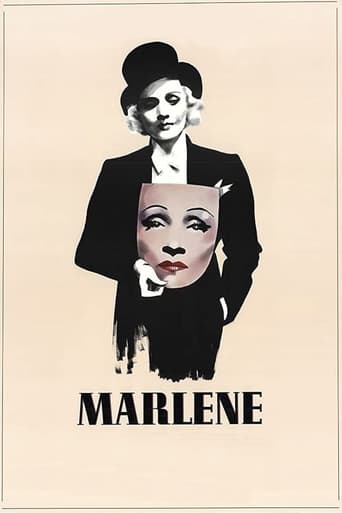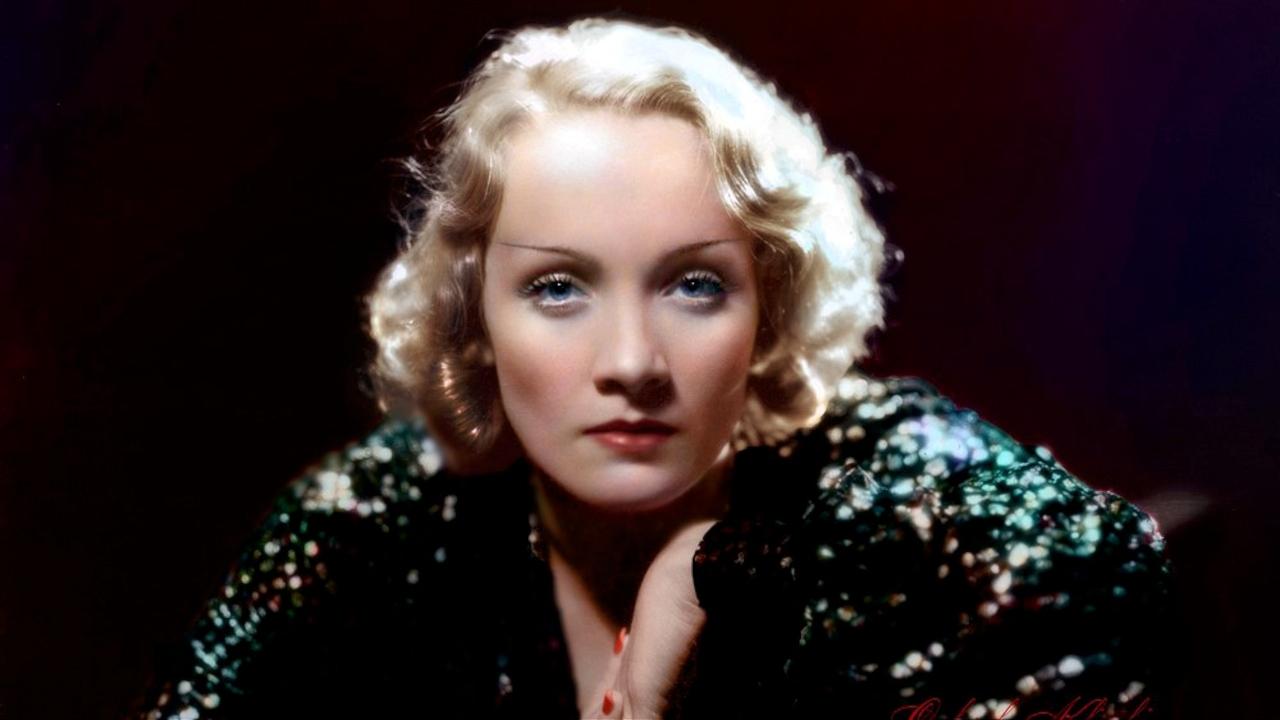U.N. Owen
MARLENE (1984) is a documentary of one of the 20th cetury's most alluring women.As I write this (late Oct, '11), we've just had the passing of APPLE CEO, Steve Jobs, and, these 2 different people have a lot in common:They both were very controlling of their image.Marlene was discovered, molded by director Josef von Sternberg. As the world, and media were quite different, Marlene was molded in different ways. Everything - from (supposedly) having her back molars removed, to the way she was lit - EVERYTHING was tightly controlled.I say this, because when MARLENE's director (and one-time Dietrich co-star) Maximillian Schell approached Dietrich, she said yes (Ms. Dietrich had for the past 20 years, had become a virtual recluse - her only prior screen appearance - JUST A GIGOLO, had featured Ms. Dietrich behind both gauze, and diffusion filters on the lens - he felt he would 'direct.'However, one of Ms. Dietrich's stipulations, was that she not be filmed - only allowing her voice to be recorded.I can understand both Mr. Schell's disappointment with this arrangement, but, I also understand Ms. Dietrich's urge to control her image. She wanted to till be perceived by her fans as she once was.It's apparent to the viewer that Ms. Dietrich felt that at this point (1984) her life was, in essence - over.Whether you agree or not, bear in mind that this is the view of a woman, who, from her teen years onward, hab been so controlled, that, as the years had passed, she was at a point in her life where (she felt) she could no longer 'create' the illusion of 'Marlene Dietrich.'Let me give a quick background;When film work became scarce, Marlene moved to the stage, where she did her incredible stage shows, but, even then - everything the public saw, was heavily controlled: lighting, the clothing (heavy under-boning, built in, to give Ms. Dietrich a 'va-va-voom' look.I can't recall who said it, but, someone had seen one of her stage performances, where she appeared (well in to her 60's!) as the eternally gorgeous Marlene Dietrich.He went backstage, and said he saw an 'old woman - ironing.' That was Ms. Dietrich, sans the lighting, the makeup, the beautifully constructed gowns.So, it is with bearing this in mind, that, by '84, Ms. Dietrich had long ago retired, from 'life,' - the artificially created, maintained 'Marlene Dietrich,' only allowing those most intimate to see her. Having said this, I can understand both Mr. Schell's disappointment with this arrangement, but, I also understand Ms. Dietrich's urge to control her image. She wanted to till be perceived by her fans as she once was.What the end result is, is a dialogue between Ms. Dietrich and, Mr.Schell - as the two watch Marlene's films, and comment on them.'Shhmutz,' (a German word meaning dirt) as well as 'kitsch' (tasteless), are two words that Ms. Dietrich uses to describe many of her best-loved, classic films. I think a large part of this film is what's NOT seen - NOT heard.The voice - still strong - is that of a woman, who sees herself, her life, as being one big performance, and, sadly, doesn't see the love, and adulation, but can only view her 'professional' self, and all it's imperfections, with a cold, clinical eye.Mr. Schell, who is obviously a fan, as well as an actor/director - tries though MARLENE to subtly get Ms. Dietrich to open up, and see the love, but, sadly, that never happens.As a fan of hers, I could laugh at her jokes, but, I still felt melancholic. You wish: 'if only she knew.'If only.
lombardo42
Today I watched a documentary on Marlene Dietrich titled 'Marlene'. It was produced in 1984 and directed by Dietrich's "Judgment at Nuremberg" co-star Maximilian Schell. I don't know how many of you know this, but Marlene agreed to do the film only if the director was in compliance with her wish not to be photographed, and because of this she does not appear in the film. But her Paris apartment is recreated to give the illusion that the actress is really there. Her voice, however, is used as the narration through the film, which is aided with various clips of her movies, concert performances and newsreel footage.To begin with, Marlene shows little interest in this whole film -- it's obvious -- and even less interest in the discussion of her movies -- that's, sadly, even more obvious. I'm convinced now more than ever that she never enjoyed working on a movie. Still, it's nice to discover that she is able to remember her experiences with a lot of clarity, sometimes using the German word "kitsch" (worthless) to describe most of her film work; although I may disagree with her on some. Marlene also talks about other things besides her films. Her singing career and personal life are briefly discussed, as well as Jean Gabin, Ernest Hemingway, Josef von Sternberg and her marriage to Rudolph Sieber.It's a strange documentary that you can't help but like. And not everything you would like to hear (even if you consider them important in her life) is mentioned a whole lot in this; such as the war years, where Marlene's tireless efforts to entertain the allied troops stationed at the front, seemed neglected. I remember hearing Schell saying to Marlene in the beginning of the film that he didn't want this to be a typical A-B-C from childhood to present interview. Well, perhaps it would've worked better had it been that way. Much of it was a mess -- not difficult to follow necessarily -- just may have been easier on Marlene's temper had there been some kind of order to the whole thing. Maybe.It gets a little heated towards the end of the film. Schell seems to have angered Marlene at one point by pressing her for a comment on one of her movies. I don't know how serious it was after the tape stopped rolling, but she evidently wasn't amused. In the end, it becomes apparent to the viewer how cranky Dietrich is at this point in her life. You could argue that it might have something to do with her age, but I think it has more to do with the fact that she was an incredibly disciplined woman who favored manners and intelligence over such common habits like idle gossip and unpreparedness. In fact, her attitude during this film is so overwhelming to the point where it's just sad. She may sound bitter, but she's a woman worth listening to regardless. Watching this documentary gives Riva's book even more credibility, in my opinion, especially in the final years of Dietrich's life where you wonder if all those incidents you read about were true.
edward wilgar
Highlights of this brilliant documentary film must include Deitrich's opinions of directors she worked with. For example Orson Welles was a genius (`Cross yourself before you mention his name'!) She appeared in `Touch of Evil' without a fee when Welles couldn't raise finance. Von Sternberg always made things difficult for her so that she would use her brain and learn something whereas Fritz Lang was a `monster' who had her marks chalked on the floor when she arrived on set but his stride was much longer than hers. Then there's the controversy of Billy Wilder denying Marlene an Oscar opportunity for her superb performance in `Witness for the Prosecution'`Marlene' includes generous extracts from many of her movies from the silent era in Germany to her final role in `Just a Gigolo' with many gems in between. Deitrich claims never to have watched her own films but director Schell runs excerpts on a video machine and gets her comments.She also talks about her contribution to the Allied war effort, the desire of the German people for strong leadership and her contempt for Hitler.Schell & Deitrich, who appeared together in ` Judgement at Nuremberg' often disagree sharply, and listening to Marlene hold her end up in the exchanges it's easy to forget that she was 82 years old when this documentary was made in 1983.Summing up, `Marlene' is a must-see for anyone interested in older movies and her rendition of `See what the boys in the back-room will have' from `Destry Rides Again' alone is worth the money.
Signet
Schell turns Dietrich's refusal to appear on-camera for him from what could have been a disaster to a distinct artistic advantage. Being able only to hear her growl her own commentary over scenes from earlier films, newsreels, etc., gives this picture an amazing power and poignancy that it would not have otherwise. An amazing movie.



 AD
AD


